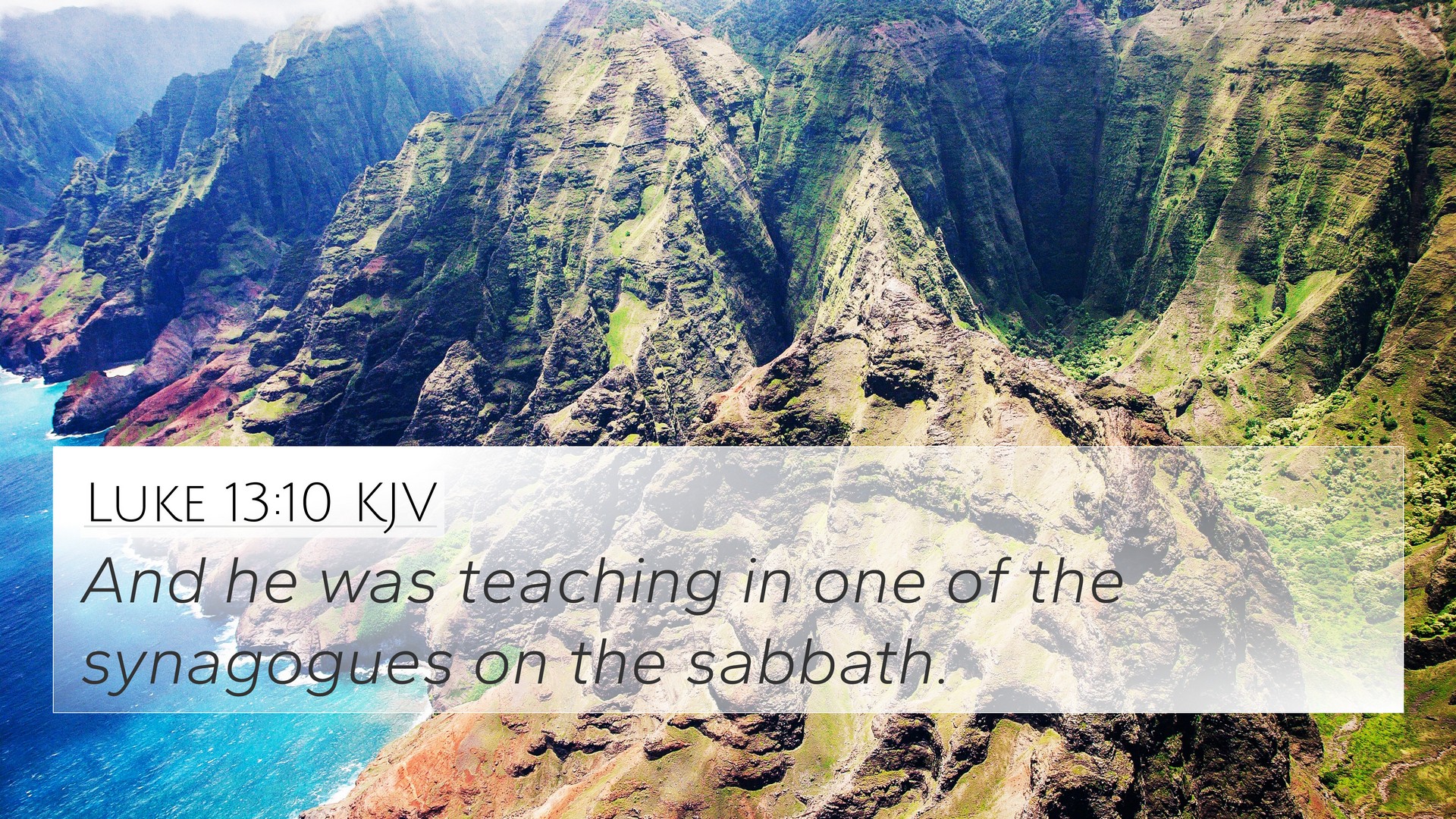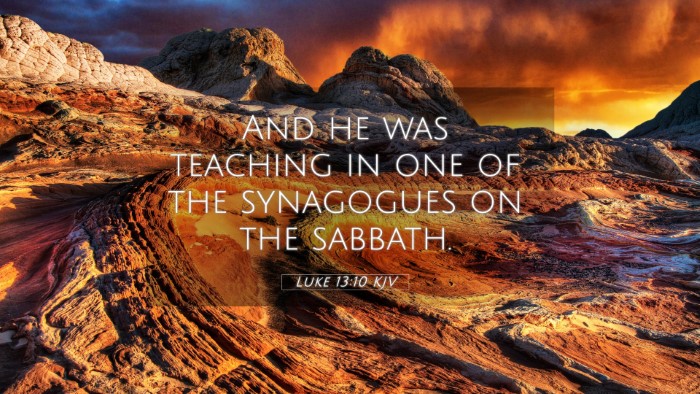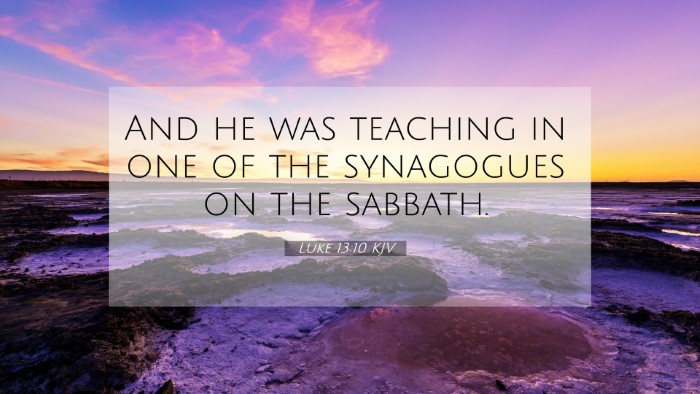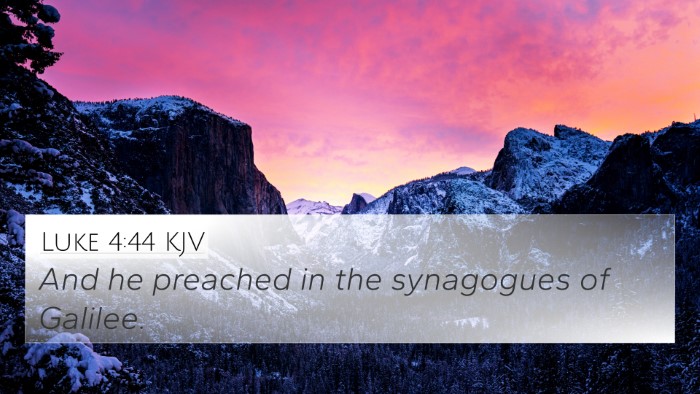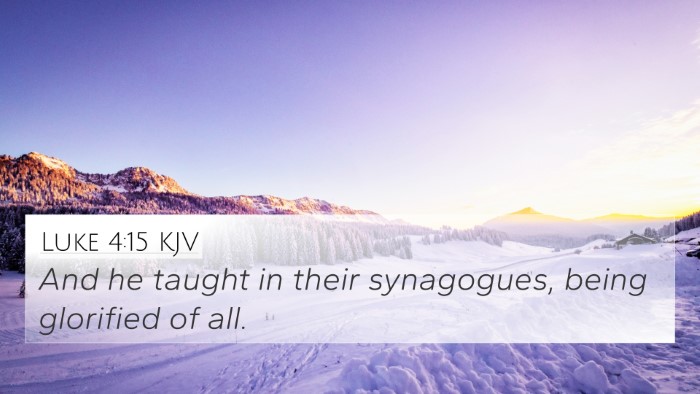Understanding Luke 13:10
Verse Context: Luke 13:10 states, "And he was teaching in one of the synagogues on the Sabbath." This verse sets the stage for a significant event in Jesus' ministry, emphasizing His role as a teacher and the nature of the Sabbath.
Commentary Insights
Matthew Henry's Commentary
Matthew Henry notes that Jesus was actively engaging with the community on the Sabbath, traditionally a day of rest and worship. This choice to teach on the Sabbath highlights the importance of spiritual nourishment over rigid adherence to the law. Henry emphasizes that Jesus' actions challenge the prevailing interpretations of the Sabbath, demonstrating that mercy and compassion should take precedence.
Albert Barnes' Commentary
Albert Barnes focuses on the significance of Jesus' teaching during a time when the Jewish leaders often criticized Him for healing on the Sabbath. He reflects on the broader implications of Jesus' teachings about the Sabbath, suggesting that the day should not merely be seen as a rule to follow, but as an opportunity for spiritual growth and healing. Barnes additionally points out that the propensity to view the Sabbath as a burden led many to miss the essence of God's intent for rest and rejuvenation.
Adam Clarke's Commentary
Adam Clarke describes the context of the synagogue, pointing out the importance of community worship. He highlights the contrast between Jesus' acts of mercy and the prevailing legalistic attitudes of the Pharisees. Clarke elucidates that Jesus teaches not just about the Sabbath, but also about the compassionate nature of God, inviting readers to see Sabbath as an occasion for doing good rather than merely refraining from work.
Bible Verse Cross-References
This verse can be cross-referenced with several other passages to gain a deeper understanding of its implications:
- Mark 2:27-28: "And he said to them, 'The Sabbath was made for man, not man for the Sabbath. So the Son of Man is lord even of the Sabbath.'"
- John 5:16-17: "And this was why the Jews were persecuting Jesus, because he was doing these things on the Sabbath. But Jesus answered them, 'My Father is working until now, and I am working.'"
- Exodus 20:8-10: "Remember the Sabbath day, to keep it holy. Six days you shall labor, and do all your work, but the seventh day is a Sabbath to the Lord your God."
- Isaiah 58:13-14: "If you turn back your foot from the Sabbath, from doing your pleasure on my holy day, and call the Sabbath a delight and the holy day of the Lord honorable..."
- Matthew 12:12: "Of how much more value is a man than a sheep! So it is lawful to do good on the Sabbath."
- Romans 14:5: "One person esteems one day as better than another, while another esteems all days alike. Each one should be fully convinced in his own mind."
- Colossians 2:16-17: "Therefore let no one pass judgment on you in questions of food and drink, or with regard to a festival or a new moon or a Sabbath..."
Thematic Bible Verse Connections
Luke 13:10 invites readers to explore various themes around the concept of the Sabbath and the nature of Jesus' ministry. Here are some connections worth exploring:
- Nature of Religious Observance: The contrast between Jesus’ approach and traditional observances raises questions about the intent behind religious practices.
- Healing and Compassion: Many parallels exist where Jesus heals on the Sabbath, emphasizing that acts of mercy align with God’s purpose for the day.
- Teaching Authority: The authority to reinterpret the law underscores Jesus’ role as a divine teacher and reformer.
- Faith over Law: Illustrating the tension between faith and legalism, Luke 13:10 serves as a reminder of the heart of God’s commandments.
- Community and Worship: The synagogue is symbolic of communal worship and the importance of gathering to hear God’s word.
Conclusion
The study of Luke 13:10 and its context reveals rich layers of meaning regarding Jesus’ ministry, His interpretation of the Sabbath, and the nature of worship. Engaging with cross-referenced Bible verses enhances understanding and fosters deeper reflection on how these principles apply today. Through tools for Bible cross-referencing and comparative Bible verse analysis, believers can uncover the intricate connections that enrich their faith journey and illuminate God’s word.
